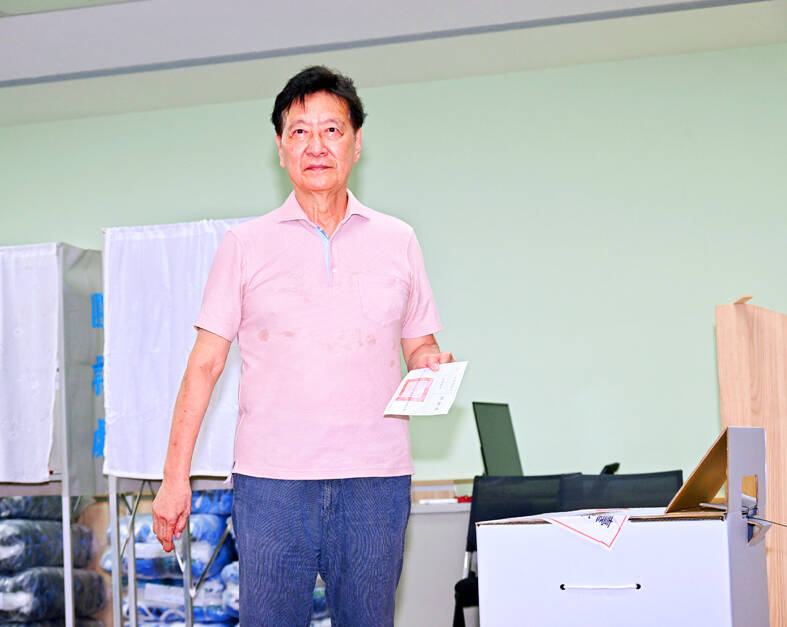Media personality and politician Jaw Shaw-kong (趙少康) was indicted yesterday on charges related to his display of a marked ballot during a recall vote in July.
According to the indictment by the Taipei District Prosecutors’ Office, Jaw had already marked his ballot at a polling station in Taipei when he showed it to the media during a July 26 vote that sought to recall 31 Chinese Nationalist Party (KMT) lawmakers and one city mayor.
Jaw was warned by a polling station worker not to show his marked ballot, but he went ahead and displayed it briefly so it could be photographed by the media, before dropping it into the ballot box, prosecutors said.

Photo: Fang Pin-chao, Taipei Times
The public display of a marked ballot contravenes election laws and carries a maximum penalty of two years in prison or a fine of NT$200,000, prosecutors said, citing articles 88 and 105 of the Civil Servants Election and Recall Act (公職人員選舉罷免法).
Jaw’s actions at the polling station were immediately reported to the police, and on Sept. 23, he was summoned by prosecutors for questioning.
He later apologized and told reporters that he had displayed his ballot merely to show that he had voted, but not to display his vote.
He said the case was a needless hassle and a waste of judicial resources.
As a prominent media figure and politician with extensive election experience, prosecutors said, adding that Jaw should have known the rules, but he deliberately displayed his marked ballot and later sought to downplay his actions.
Following his indictment yesterday, Jaw said he has always respected the judiciary and answered all the prosecutors’ questions.
He said he had hoped that prosecutors would not pursue the case or, in the worst-case scenario, offer him deferred prosecution.
However, everything should be done in accordance with the law, he said, expressing remorse and promising to be more careful in the future.
Jaw, a former chairman of Taiwan’s Broadcasting Corporation of China, served as a KMT lawmaker from the late 1980s to the early 1990s. Over the years, he has remained a prominent voice in local media and politics, and he ran unsuccessfully on the KMT ticket for vice president last year.

Three Taiwanese airlines have prohibited passengers from packing Bluetooth earbuds and their charger cases in checked luggage. EVA Air and Uni Air said that Bluetooth earbuds and charger cases are categorized as portable electronic devices, which should be switched off if they are placed in checked luggage based on international aviation safety regulations. They must not be in standby or sleep mode. However, as charging would continue when earbuds are placed in the charger cases, which would contravene international aviation regulations, their cases must be carried as hand luggage, they said. Tigerair Taiwan said that earbud charger cases are equipped

Foreign travelers entering Taiwan on a short layover via Taiwan Taoyuan International Airport are receiving NT$600 gift vouchers from yesterday, the Tourism Administration said, adding that it hopes the incentive would boost tourism consumption at the airport. The program, which allows travelers holding non-Taiwan passports who enter the country during a layover of up to 24 hours to claim a voucher, aims to promote attractions at the airport, the agency said in a statement on Friday. To participate, travelers must sign up on the campaign Web site, the agency said. They can then present their passport and boarding pass for their connecting international

UNILATERAL MOVES: Officials have raised concerns that Beijing could try to exert economic control over Kinmen in a key development plan next year The Civil Aviation Administration (CAA) yesterday said that China has so far failed to provide any information about a new airport expected to open next year that is less than 10km from a Taiwanese airport, raising flight safety concerns. Xiamen Xiangan International Airport is only about 3km at its closest point from the islands in Kinmen County — the scene of on-off fighting during the Cold War — and construction work can be seen and heard clearly from the Taiwan side. In a written statement sent to Reuters, the CAA said that airports close to each other need detailed advanced

The age requirement for commercial pilots and airline transport pilots is to be lowered by two years, to 18 and 21 years respectively, to expand the pool of pilots in accordance with international standards, the Ministry of Transportation and Communications announced today. The changes are part of amendments to articles 93, 119 and 121 of the Regulations Governing Licenses and Ratings for Airmen (航空人員檢定給證管理規則). The amendments take into account age requirements for aviation personnel certification in the Convention on International Civil Aviation and EU’s aviation safety regulations, as well as the practical needs of managing aviation personnel licensing, the ministry said. The ministry